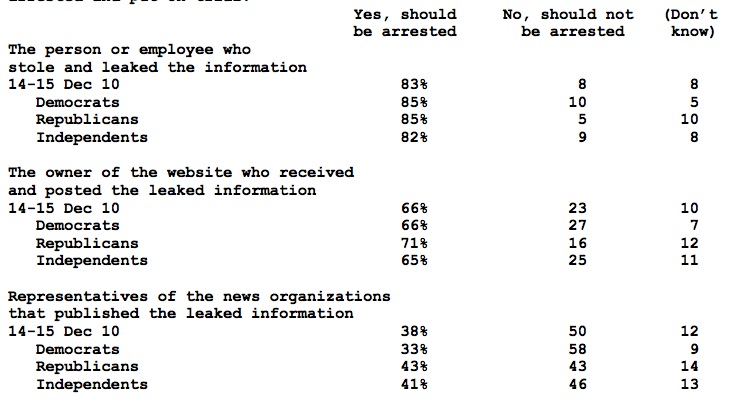Excerpt from the most recent Fox News poll about WikiLeaks. Note the similarity between Republicans and Democrats. And the more lenient view respondents appear to take towards the New York Times, which, after all, is also publishing the leaked cables.
After writing the previous post, I came on Jay Rosen’s excellent piece about the failure of US mainstream journalism in the run-up to the Iraq war, and that in turn led to Michael Massing’s magisterial piece in the NYRB in 2004. Massing opens his critique thus:
In recent months, US news organizations have rushed to expose the Bush administration’s pre-war failings on Iraq. “Iraq’s Arsenal Was Only on Paper,” declared a recent headline in The Washington Post. “Pressure Rises for Probe of Prewar-Intelligence,” said The Wall Street Journal. “So, What Went Wrong?” asked Time. In The New Yorker, Seymour Hersh described how the Pentagon set up its own intelligence unit, the Office of Special Plans, to sift for data to support the administration’s claims about Iraq. And on “Truth, War and Consequences,” a Frontline documentary that aired last October, a procession of intelligence analysts testified to the administration’s use of what one of them called “faith-based intelligence.”
Watching and reading all this, one is tempted to ask, where were you all before the war? Why didn’t we learn more about these deceptions and concealments in the months when the administration was pressing its case for regime change—when, in short, it might have made a difference? Some maintain that the many analysts who’ve spoken out since the end of the war were mute before it. But that’s not true. Beginning in the summer of 2002, the “intelligence community” was rent by bitter disputes over how Bush officials were using the data on Iraq. Many journalists knew about this, yet few chose to write about it.
“That’s not getting the story wrong”, writes Rosen. “That’s redefining the job as: reflecting what the government thinks.”
This was the nadir. This was when the watchdog press fell completely apart: On that Sunday when Bush Administration officials peddling bad information anonymously put the imprimatur of the New York Times on a story that allowed other Bush Administration officials to dissemble about the tubes and manipulate fears of a nuclear nightmare on television, even as they knew they were going to war anyway.
The government had closed circle on the press, laundering its own manipulated intelligence through the by-lines of two experienced reporters, smuggling the deed past layers of editors, and then marching it like a trained dog onto the Sunday talk shows to perform in a lurid doomsday act.
Something similar is going on now with WikiLeaks. The American public is being softened up for another Administration ‘coup’. The Fox News poll suggests that this time it’ll be even easier to pull it off.

